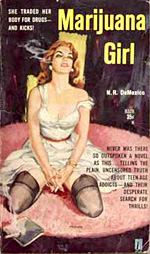I blame the paperbacks.
I blame those 1950s, lurid-covered, pocket-sized publications of Fawcett, Popular Library, Signet, Carnival and more for staining the term “pulp” for generations to come. (The pulp magazines had enough lurid material by themselves, thank you.)

It’s such that whenever someone asks me about my hobby, I say that I’m interested in popular fiction magazines from the mid-century. If I said, “Oh, I like reading and collecting pulps” (as I have on occasion), most everyone assumes I’m talking about those lurid paperback books.
(Okay, I’ll stop using the word “lurid.”)
This confusion also makes it difficult to search for pulp magazine listings on eBay. You constantly wind up with listings for “pulp sleaze” paperbacks.
Maybe the stories published in those cheap paperbacks — with themes ranging from teen rebels, girls-gone-bad, gay and lesbian, and noirish crime — should more properly be called “pulp-like fiction,” rather than “pulp fiction.” (But that would make for a convoluted title for Quentin Tarantino’s flick.)
Maybe just “cheesy paperback” would fit the bill.
Call me a “pulp purist” if you’d like. But to me, “pulp” is strictly fiction published in the pulpwood magazines.
– William


Amen, brother. Amen!
This has always been a thorn in my side ever since I learned about the cheesy paperback garbage mistaken for pulp.
Amen, again.
I couldn’t agree more !!!!